
Understanding the Importance of Background Checks for Hiring
Background checks are an essential part of the hiring process, helping employers make informed decisions about potential candidates. They help verify key information, assess risk, and ensure compliance with various legal requirements. With the rise of workplace fraud, security concerns, and the growing complexity of legal regulations, it is more important than ever for employers to conduct thorough background checks before making hiring decisions.
What Are Background Checks?
Background checks are the process of verifying the personal, professional, and criminal history of a job candidate. These checks typically include criminal background checks, employment history verification, education verification, reference checks, credit reports, and drug testing. By conducting these checks, employers can confirm that candidates are qualified, trustworthy, and do not pose a risk to the organization.
Types of Background Checks
- Criminal Background Checks Criminal background checks are vital for identifying any criminal history that may disqualify a candidate from a role. These checks ensure that potential hires do not have a history of violent or fraudulent behavior that could jeopardize workplace safety or productivity.
- Employment History Verification Verifying a candidate’s employment history is essential to ensure that they have the experience and qualifications they claim. This step prevents fraudulent claims and confirms the accuracy of the information provided by the applicant.
- Education Verification Confirming educational qualifications is crucial to avoid hiring individuals who misrepresent their academic background. This verification ensures that candidates meet the educational requirements for the position.
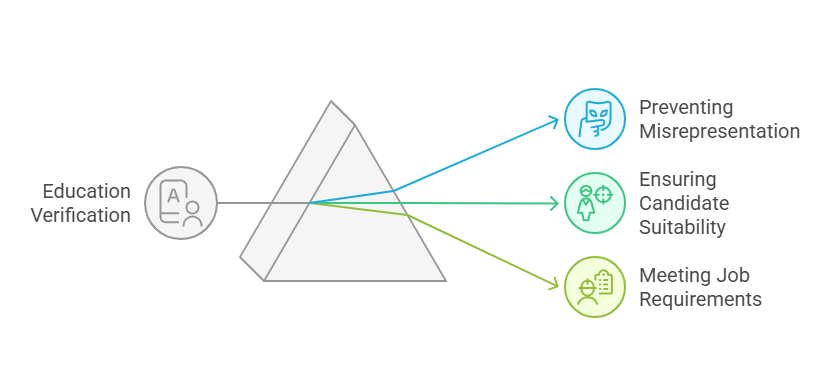
- Credit Report Checks For roles that involve financial responsibilities, credit report checks help evaluate the financial responsibility of a candidate. These checks are particularly relevant for positions in finance or those that require access to sensitive company assets.
- Drug Testing In certain industries, drug testing is essential to ensure that employees are fit for work and adhere to the company’s drug-free policies. It is particularly critical in sectors such as transportation, construction, and healthcare, where safety is paramount.
- Reference Checks Contacting references provides additional insight into a candidate’s work ethic, character, and interpersonal skills. This information can help employers assess whether the candidate would be a good fit for the team.
Top 5 Reasons Background Checks Are Essential for Effective Hiring
1. Reduces the Risk of Negligent Hiring
Performing background checks minimizes the chances of hiring individuals who may have a history of criminal behavior or poor performance in previous roles. By doing so, employers can avoid negligent hiring practices, which could expose them to legal risks or harm the workplace environment.
2. Ensures a Safe and Secure Workplace
Background checks are crucial for creating a safe and secure workplace. By screening candidates for criminal backgrounds or any history of violence, employers can ensure that new hires will not pose a threat to the safety and well-being of other employees.
3. Verifies Candidate Qualifications
Verifying education and employment history ensures that the candidate possesses the skills and experience they claim. This helps prevent costly hiring mistakes, ensuring that only qualified individuals are hired for the job.
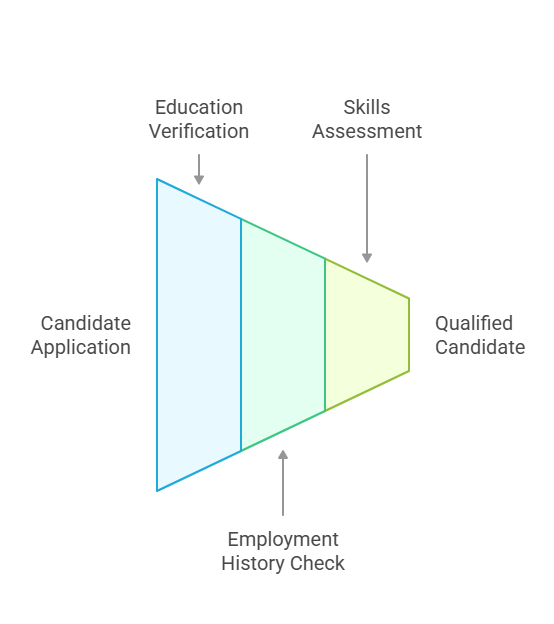
4. Promotes Legal Compliance
Employers must comply with various laws when hiring, including the Fair Credit Reporting Act (FCRA) and Equal Employment Opportunity Commission (EEOC) guidelines. Background checks help employers stay compliant with these laws, avoiding potential legal issues.
5. Reduces Turnover and Improves Retention
By making informed hiring decisions, employers are more likely to hire candidates who fit well with the job and organizational culture. This leads to lower turnover rates and higher retention, as employees are more satisfied with their roles and less likely to leave.
5 Key Reasons Background Checks Are Essential
| Reason | Description |
|---|---|
| Reduces Risk of Negligent Hiring | Prevents hiring individuals with criminal records or harmful histories. |
| Ensures a Safe and Secure Workplace | Ensures employees don’t pose a threat to safety or security. |
| Verifies Candidate Qualifications | Confirms that candidates possess the qualifications they claim. |
| Promotes Legal Compliance | Ensures compliance with employment laws and regulations. |
| Reduces Turnover and Improves Retention | Helps to hire the right candidates, improving long-term retention. |
By conducting thorough background checks, employers can ensure that they are making informed, legally compliant, and risk-free hiring decisions that lead to better employee retention and overall organizational success.
Why Background Checks Are Crucial for Effective Hiring Decisions
Background checks are an essential part of the hiring process. They serve as a safeguard, helping employers avoid risks and make informed decisions. With the complex legal landscape and increasing concern for workplace safety, employers must conduct thorough background checks to ensure they are hiring the right candidates. These checks help verify qualifications, reduce liability, and foster a safe work environment.
The Importance of Background Checks
Background checks help employers understand the full profile of a potential hire. They go beyond the resume and interviews, providing an objective assessment of a candidate’s criminal history, education, and past employment. By cross-checking this information, employers can confirm the candidate’s claims, which reduces the risk of fraud and negligent hiring. In 2025, background checks are becoming more sophisticated, addressing key areas such as compliance with labor laws and ensuring workplace safety.
Types of Background Checks Employers Conduct
Employers should conduct several key types of background checks to ensure that candidates meet the necessary standards for the role:
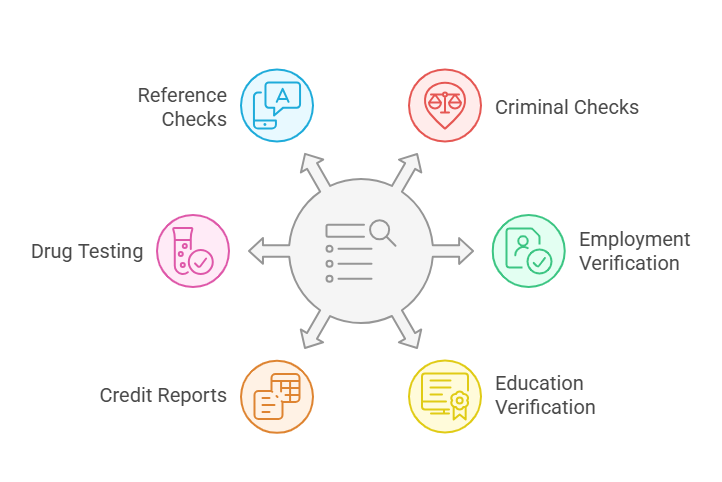
- Criminal Background Checks Criminal background checks are essential for identifying any criminal history, ensuring that candidates with a history of serious offenses (such as violence or theft) are not hired for positions that would expose the organization to unnecessary risk.
- Employment History Verification Verifying a candidate’s past employment helps confirm that they have the relevant experience and job history necessary for the role. It also verifies whether the candidate has a pattern of staying in jobs or whether there are unexplained gaps in employment.
- Education Verification This check ensures that the candidate’s educational claims are accurate. It prevents fraud, especially in positions requiring specific degrees or certifications, and gives employers confidence that the candidate is properly qualified.
- Credit Reports For roles that involve managing finances or handling sensitive company assets, a credit report check is an essential part of the hiring process. It helps evaluate the financial responsibility of the candidate and reduces risks associated with potential financial misconduct.
- Drug Testing Drug testing is a critical practice in ensuring that candidates are fit for work. This is particularly crucial for industries where safety is a concern, such as construction, transportation, and healthcare.
- Reference Checks Checking references allows employers to get an insider’s perspective on the candidate’s work ethic, reliability, and personality. These insights can help identify potential red flags and determine if the candidate is a good fit for the organization.
The Top 5 Reasons Background Checks Are Essential for Effective Hiring
1. Minimizes the Risk of Negligent Hiring
One of the main reasons for conducting background checks is to mitigate the risk of negligent hiring. Negligent hiring occurs when an employer hires someone without properly vetting them, leading to potential safety issues, financial loss, or legal liability. Background checks can identify red flags that employers would otherwise miss, ensuring that only qualified and trustworthy candidates are hired.
2. Ensures a Safe Work Environment
Background checks play a crucial role in maintaining workplace safety. By screening candidates for violent or harmful behavior, employers can prevent potential workplace incidents and create a safe environment for all employees. Whether it’s criminal history or past workplace behavior, these checks ensure that candidates do not pose a risk to their colleagues.
3. Verifies Candidate Qualifications
Background checks help verify the information provided by candidates during the hiring process. Employers can ensure that a candidate’s education, employment history, and certifications are accurate and up to date. This is particularly important for positions requiring specific qualifications or experience.
4. Ensures Compliance with Legal Requirements
With changing laws and regulations, compliance is an essential part of the hiring process. Conducting background checks helps ensure that employers comply with the Fair Credit Reporting Act (FCRA), Equal Employment Opportunity Commission (EEOC) guidelines, and state-specific labor laws. These regulations help protect both the candidate and the employer during the hiring process.
5. Reduces Employee Turnover and Improves Retention
Proper background checks not only help employers hire the right candidate but also reduce turnover by ensuring better long-term fits. When candidates are hired based on accurate information and qualifications, they are more likely to perform well in their roles and remain with the company for longer periods. This results in better employee satisfaction and reduced hiring costs.
Why Employers Should Invest in Thorough Background Checks
Investing in comprehensive background checks is an investment in the success and safety of the company. By making informed hiring decisions, employers can ensure that they are hiring qualified, trustworthy, and compliant candidates. This leads to improved productivity, a safer workplace, and a more positive organizational culture.
| Reason | Description |
|---|---|
| Reduces Risk of Negligent Hiring | Identifies criminal backgrounds and verifies qualifications to prevent hiring mistakes. |
| Ensures a Safe and Secure Workplace | Protects the workplace from potential safety and security risks. |
| Verifies Candidate Qualifications | Confirms candidates meet the required qualifications for the job. |
| Ensures Legal Compliance | Helps employers meet legal and regulatory standards, reducing liability. |
| Reduces Turnover and Improves Retention | Improves employee retention by hiring the right candidates from the start. |
By incorporating these practices into the hiring process, employers can make confident, compliant, and effective hiring decisions. Conducting background checks helps minimize risks, ensures compliance with laws, and fosters a safer and more productive work environment.
Top 5 Reasons Background Checks Are Essential for Effective Hiring
Background checks are a critical step in the hiring process, helping employers ensure that they are making the right decisions when hiring candidates. Thorough background checks not only minimize hiring risks but also help employers maintain compliance with legal requirements, improve retention, and promote workplace safety. In this article, we will explore the top 5 reasons why background checks are essential for effective hiring, along with the legal considerations employers must be aware of.
Understanding the Importance of Background Checks
Before diving into the specific reasons background checks are essential, it’s important to define what they are and why they are so crucial in the hiring process.
What Are Background Checks?
A background check is a process in which an employer verifies the history of a potential employee. It often includes checking criminal records, employment history, education verification, reference checks, and sometimes credit reports or drug tests. Employers use these checks to ensure that the candidate is trustworthy, qualified, and does not pose a risk to the organization or other employees.
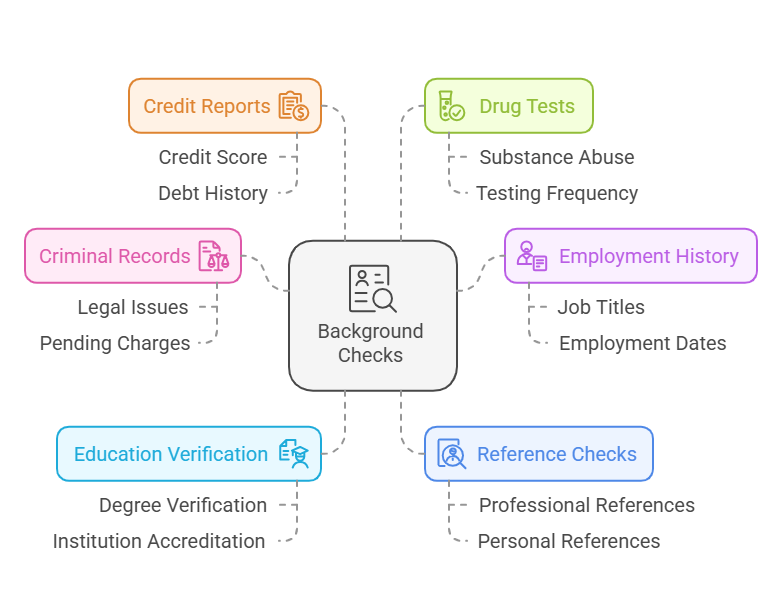
Types of Background Checks
- Criminal Background Checks: Verifying if a candidate has a criminal history to assess the potential risk they may pose in the workplace.
- Employment History Verification: Confirming that a candidate has the work experience they claim.
- Education Verification: Ensuring a candidate has the educational qualifications they claim to have.
- Credit Reports: Sometimes used for roles involving financial responsibilities to verify the candidate’s financial responsibility.
- Drug Testing: Checking whether a candidate is fit for work and adheres to company policies.
- Reference Checks: Speaking with previous employers or other references to verify the candidate’s qualifications and character.
These background checks ensure that employers are making informed decisions and can prevent future hiring mistakes.
Top 5 Reasons Background Checks Are Essential for Effective Hiring
1. Reduces Risk of Negligent Hiring
One of the most critical reasons for conducting background checks is to reduce the risk of negligent hiring. By identifying red flags such as criminal records, past misconduct, or falsified qualifications, employers can avoid hiring candidates who may pose risks to the workplace. Negligent hiring can result in workplace accidents, fraud, or violence, leading to lawsuits, high turnover, and damage to the company’s reputation.
2. Ensures a Safe and Secure Workplace
Background checks play a vital role in ensuring a safe and secure workplace. By screening for criminal records and other potential safety concerns, employers can create a safer environment for all employees. This is particularly important in industries where employees interact with vulnerable populations, handle sensitive information, or operate heavy machinery. A thorough background check can help employers prevent security breaches, violence, and other safety issues.
3. Verifies Candidate Qualifications
Employment and education verification are essential parts of background checks to confirm that candidates possess the qualifications they claim. By verifying the accuracy of a candidate’s resume, employers can ensure they are hiring someone with the right skills and experience. This helps in reducing the risk of hiring underqualified candidates who might negatively impact the organization’s performance.
4. Promotes Legal Compliance
Employers are required to comply with various labor laws when conducting background checks. These include the Fair Credit Reporting Act (FCRA), Equal Employment Opportunity Commission (EEOC) guidelines, and state-specific regulations like Ban-the-Box laws. Conducting background checks ensures that employers are legally compliant, helping them avoid potential legal pitfalls and lawsuits related to discrimination or privacy violations.
5. Reduces Turnover and Improves Retention
Making informed hiring decisions based on background checks can lead to better employee retention. By hiring candidates who are a good fit for the role, possess the right qualifications, and align with the company’s values, employers can reduce turnover. High turnover can be costly, both financially and in terms of morale, but thorough background checks help ensure that new hires are more likely to stay long-term, improving overall organizational performance.
5 Key Reasons Background Checks Are Essential
| Reason | Description |
|---|---|
| Reduces Risk of Negligent Hiring | Prevents hiring individuals with criminal records or harmful histories. |
| Ensures a Safe and Secure Workplace | Ensures employees don’t pose a threat to safety or security. |
| Verifies Candidate Qualifications | Confirms that candidates possess the qualifications they claim. |
| Promotes Legal Compliance | Ensures compliance with employment laws and regulations. |
| Reduces Turnover and Improves Retention | Helps to hire the right candidates, improving long-term retention. |
Comparing Background Check Providers: RapidHireSolutions vs Competitors
In choosing a background check provider, employers need a service that can offer reliable, compliant, and timely checks. Here’s how RapidHireSolutions compares to competitors in the background check space.
Comparison Table: RapidHireSolutions vs Competitors
| Feature | RapidHireSolutions ✅ | Competitor ❌ |
|---|---|---|
| Speed of Service | ✅ 24-hour turnaround | ❌ 10-15 days |
| Compliance | ✅ Fully compliant with FCRA, EEOC, and state regulations | ❌ Inconsistent compliance with labor laws |
| Accuracy | ✅ High accuracy rate | ❌ Higher error rates |
| Customer Support | ✅ 24/7 support | ❌ Limited support hours |
| Pricing | ✅ Affordable with transparent pricing | ❌ Hidden fees and high costs |
Why Choose RapidHireSolutions?
RapidHireSolutions stands out for its ability to offer fast, accurate, and compliant background check services. With a 24-hour turnaround, this service ensures employers can make informed decisions quickly. The provider also complies with all legal requirements, including FCRA and EEOC guidelines, ensuring that background checks are legally sound. The accuracy of RapidHireSolutions helps reduce the risk of costly hiring mistakes, and its transparent pricing structure avoids hidden fees and unexpected costs.
Legal Considerations for Background Checks in 2025
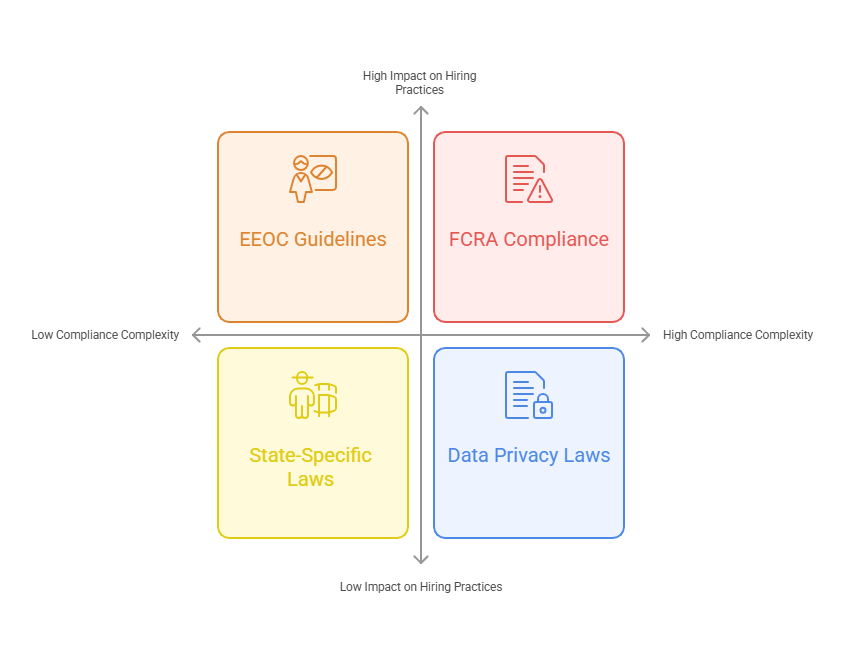
When conducting background checks, employers must be aware of several legal considerations to stay compliant and avoid potential legal issues.
- FCRA Compliance: Employers must comply with the Fair Credit Reporting Act, which regulates the use of consumer reports for employment purposes.
- EEOC Guidelines: Employers must adhere to Equal Employment Opportunity Commission guidelines, ensuring they don’t discriminate against candidates based on protected characteristics.
- State-Specific Laws: Many states have laws such as Ban-the-Box and Salary History Bans, which restrict when and how employers can ask about criminal history or salary history.
- Data Privacy Laws: Employers must also follow data privacy laws like GDPR, ensuring secure handling of personal information during the background check process.
FAQs: Employment Background Checks
Why are background checks necessary for hiring?
Background checks help identify criminal histories, verify education, and assess employment qualifications, ensuring employers make informed and safe hiring decisions.
What types of background checks are typically conducted?
Employers commonly perform criminal background checks, education verification, employment history checks, credit reports, and drug testing.
How long does it take to complete a background check?
RapidHireSolutions typically completes background checks in 24 hours, while competitors may take 10-20 days.
Are background checks legally required?
Background checks are not always legally required but help ensure compliance with labor laws and reduce risks associated with negligent hiring.
What should I do to stay compliant when performing background checks?
Ensure written consent from candidates, stay up-to-date with FCRA and EEOC regulations, and choose a compliant service like RapidHireSolutions.
Conclusion
Background checks are an essential component of the hiring process that help employers make informed, safe, and legally compliant hiring decisions. By reducing risks, ensuring workplace safety, verifying qualifications, and promoting legal compliance, background checks ultimately improve employee retention and the overall hiring process.
RapidHireSolutions is a top provider in the background check industry, offering fast turnaround times, accurate results, and compliance with all relevant regulations. Employers can trust RapidHireSolutions to provide reliable, affordable, and efficient background check services, helping them build a safer, more qualified workforce in 2025.
